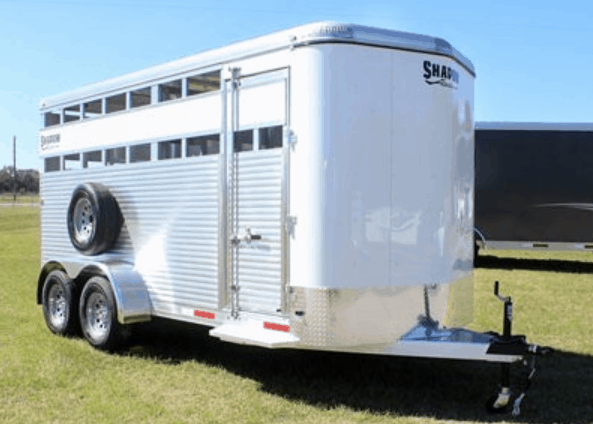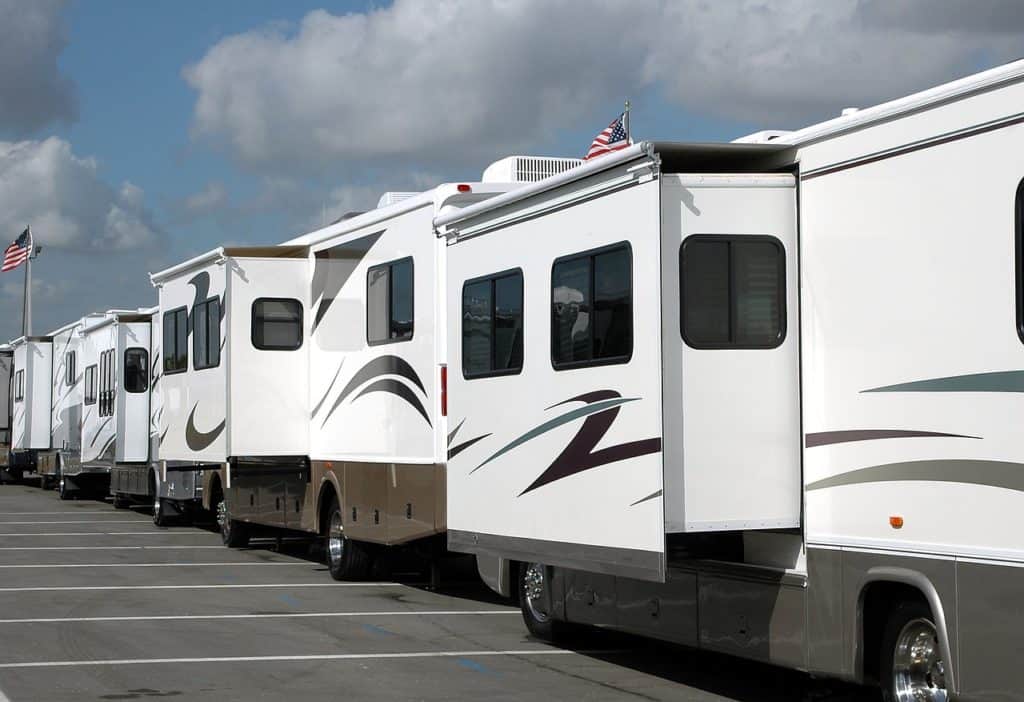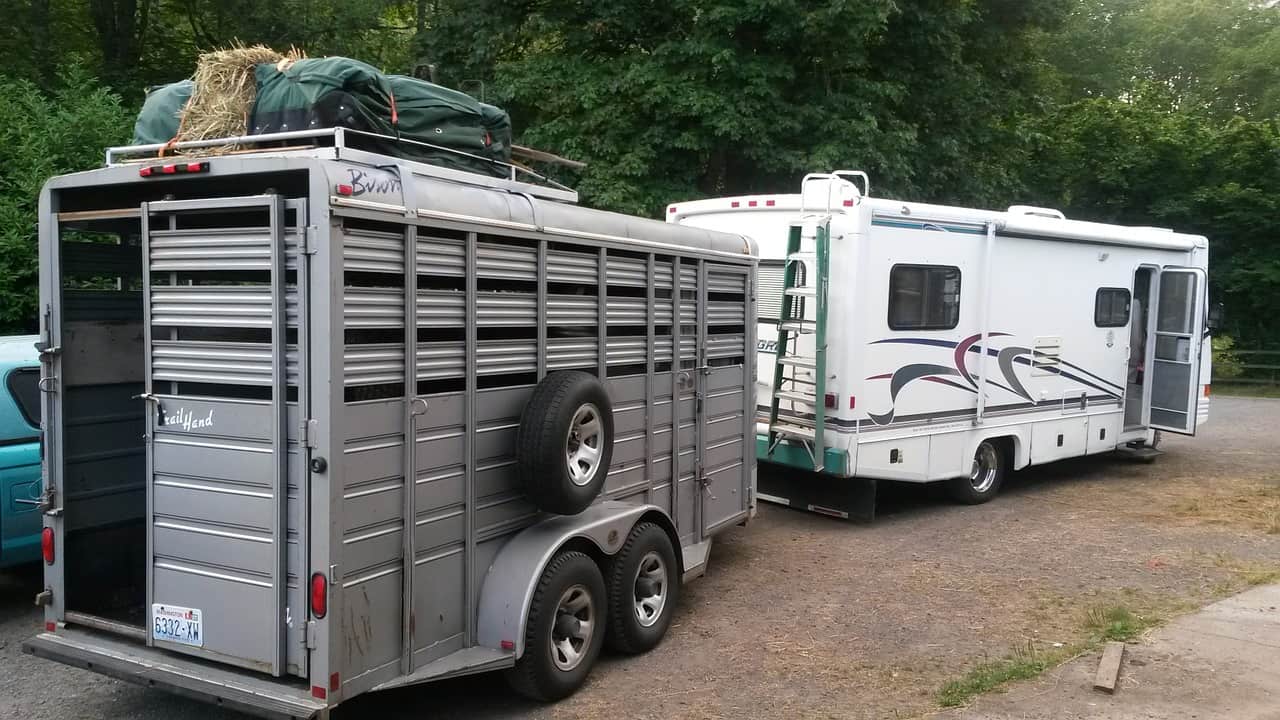RVs usually have a pretty good towing capacity but just like every other tow vehicle on the road, they do have their max tow limits.
So if you’re trying to tow a large trailer or horse trailer behind your motorhome there are some things you need to keep in mind.
A large Class A or Super Class C motorhome can usually pull a horse trailer as long as the gross vehicle weight of the horse trailer is under the recommended max tow weight of the RV. However, if you have a smaller RV like a Class B or regular Class C you more than likely will not be able to pull a horse trailer.
But what constitutes a large RV and how can you know if your specific RV setup can tow a horse trailer?
In the rest of this article, we will be discussing just that, as we use specific examples to help you decide if your own RV can pull a horse trailer.
Towing a Horse Trailer with an RV

How Much Does a Horse Trailer Weigh?
Just like RV’s, horse trailers can come in all different sizes and configurations so before we go any further it’s important to come up with some average horse trailer weights.
This way we will have some general numbers to work with when trying to decide if a specific RV can pull a horse trailer.
Note that we have intentionally left off large horse trailers from the below categories as they are almost always gooseneck trailers that are meant to be pulled by a fifth-wheel and cannot be pulled by the bumper of an RV.
Small Horse Trailer Weight
Small horse trailers are usually designed to transport one or two horses at a time and typically weigh between 2,000 and 3,500 pounds empty.
However, keep in mind that this is just the weight of the trailer itself as it doesn’t include the weight of the animals or the gear inside the trailer.
So when fully loaded the gross vehicle weight of a small horse trailer will usually come in around 6,000 to 8,000 pounds.
Medium Horse Trailer Weight
Medium Horse trailers meant to transport up to 3 horses at a time that might also have a small dressing room or tack room will usually weigh anywhere from 3,000 to 4,000 pounds empty.
And once fully loaded down with animals and gear the GVWR of a medium-sized horse trailer will usually come in around 7,000 to 9,000 pounds.
Towing Capacity Needed for a Horse Trailer
In order to pull a fully loaded small horse trailer, your tow vehicle will need a max tow capacity of 10,000 pounds ideally, as this will keep you under the 80% mark of max towing capacity for the vehicle.
If you have a medium-sized horse trailer you will need a tow vehicle with a max tow capacity of 12,000 pounds ideally, in order to stay under the 80% mark of the max towing capacity of the vehicle.

10 RV Models and their Max Towing Capacity
If you want to comfortably pull a horse trailer behind your RV with no issues, you’re going to need either a large class A motorhome or a Super Class C motorhome.
As Large Class A motorhomes are built on bus chassis with upgraded suspensions as well as drivetrains to handle the extra load and usually have a towing capacity between 10,000 to 15,000 pounds.
While Super Class C motorhomes are built on heavy-duty semi-truck chassis that have even more robust suspensions as well as drivetrains for the extra towing load and have a towing capacity of up to an incredible 25,000 pounds!
However, not all class A motorhomes can pull a horse trailer, and your standard class C motorhomes usually can’t, due to their lower max towing weight of around 5,000 to 7,500 pounds.
| Model | Type | Length | Max Tow Weight | Pull a Horse Trailer? |
| Winnebago Forza 34T Diesel | Class A | 35’6″ | 10,000 lbs. | Yes |
| Entegra Accolade 37TS Diesel | Super Class C | 39′ | 12,000 lbs. | Yes |
| Thor Maramar 32.2 | Class A | 34′ 1″ | 8,000 lbs. | Small Light Horse Trailer Possibly |
| Coachman Freelander 26RS | Class C | 27′ 11″ | 5,000 lbs. | No |
| Winnebago Vista 27P | Class A | 28′ 5″ | 5,000 lbs. | No |
| Renegade Verona LE 40LRB Diesel | Super Class C | 40′ | 20,000 lbs. | Yes |
| Thor Tuscany 40RT Diesel | Class A | 41′ 1″ | 15,000 lbs. | Yes |
| Winnebago Outlook 22C | Class C | 24’8″ | 7,500 lbs. | Small Light Horse Trailer Possibly |
| Coachman Pursuit 31BH | Class A | 31’9″ | 5,000 lbs. | No |
| Thor Four Winds 31B | Class C | 32′ 2″ | 8,000 lbs. | Small Light Horse Trailer Possibly |
How to Determine the Towing Capacity of Your RV
There are a few different ways to determine how much your RV can tow which we have broken down below.
- The best way to determine how much your RV can tow is to look in the RV’s owner manual as it will almost always be listed there.
- If you don’t have the owner’s manual for your RV, the next best place to look is on the inside of the driver door well as there is usually a list of weights for your RV there such as the total gross vehicle weight of the RV, how much each axle is rated for, and hopefully what the towing capacity of the RV is.
- When all else fails you can try contacting the dealer you purchased the RV from to see if they can come up with the max tow weight or do a quick Google search for the max tow capacity of your RV.
80 Rule for Towing and How it Affects the Max Tow Rating?
The 80 rule for towing, is a rule for towing that states you shouldn’t tow anything heavier than 80% of the max rated tow weight for the vehicle.
So if the vehicle’s max tow weight is 10,000 pounds, the 80 rule for towing would dictate you don’t pull more than 8,000 pounds with the vehicle.
Many RVers use this 80 rule for towing to come up with how much their vehicle or RV can comfortably tow in all conditions, as this provides a nice cushion to handle more extreme terrain or inclines when pulling an RV or trailer.
For example, there is a big difference between towing an RV along flat ground and towing an RV up the side of a mountain. And because of this, the 80 rule for towing gives you that extra cushion that helps to ensure you can comfortably tow your rig no matter how difficult the terrain might get.
Using the 80 rule for towing also helps to ensure you’re not constantly maxing out your tow vehicle’s engine, chassis, and suspension as well, which can potentially shorten the life of your tow vehicle.
It’s important to understand though that this 80 rule for towing is not a vehicle manufacturer mandate and instead is just a user-generated guideline that many RVers use when trying to determine their ideal max tow weight.
Even though the 80 rule for towing is really more of a recommendation as opposed to an industry rule, in general, it’s still a best practice to follow the 80 rule for towing whenever possible.
5 Easy Ways to Improve the Towing Capacity of your Vehicle
While you never want to exceed the max tow rating of your vehicle, there are some things you can do to improve your towing capacity to help your vehicle tow more weight comfortably.
1. Use a Weight Distribution Hitch or a Load Leveling Hitch
A weight distribution hitch or a load-leveling hitch does just what the name implies as it distributes more of the weight of the RV or trailer to the tow vehicle’s front axle as opposed to solely on the hitch receiver area.
Using a weight-distribution hitch will improve your tow vehicle’s towing capacity by removing some of the weight from the hitch receiver area and spreading it out more evenly across the tow vehicle, eliminating the sag you sometimes see between the trailer and the tow vehicle.
2. Use Anti-Sway Bars
While a weight-distribution hitch spreads the load of the trailer more evenly across the tow vehicle, sway bars help to control the actual trailer, minimizing the swaying of the trailer due to wind or other vehicles.
While anti-sway bars are not mandatory or absolutely necessary they can go along way in helping to improve your tow vehicles towing capacity and provide a much more enjoyable towing experience while going down the road.
3. Make Sure the Weight in the Trailer is Evenly Distributed
When packing your RV or trailer make sure you are placing the weight as evenly as possible throughout the trailer in order to create a more balanced weight and trailer.
Creating a more balanced trailer will allow your tow vehicle to more comfortably pull the trailer down the road and will eliminate excess weight on the trailer hitch.
4. Move as Much Gear into the Tow Vehicle as Possible
While you don’t want to overload the tow vehicle or exceed its max gross vehicle weight, the more gear and weight you can load into the tow vehicle means less weight you will have to tow in the trailer.
5. Upgrade Your Tow Vehicles Brakes and Rotors
Even if you have an electric brake controller in your tow vehicle and your trailer has its own brakes.
You might want to consider upgrading your tow vehicle’s brakes and rotors in order to provide better braking and stopping power when going down steep inclines or in an emergency braking situation, helping to improve your tow vehicle’s towing capacity.
Recent Posts
47 RV Storage Ideas to Maximize Your Space for Compact Living
Camping and living in an RV is an incredible adventure, but it comes with its fair share of challenges, particularly around storage, due to the lack of space. Because of this, it's a must to make...
Are you looking to give your RV a cozy, rustic makeover? If so, farmhouse decor is the perfect style to transform your camper into a warm and inviting home on wheels. In this blog post, I'll...

